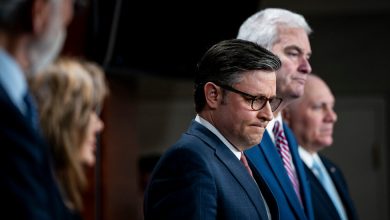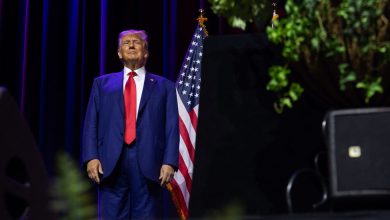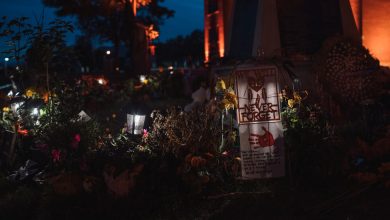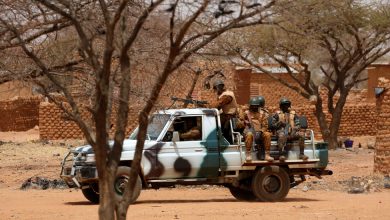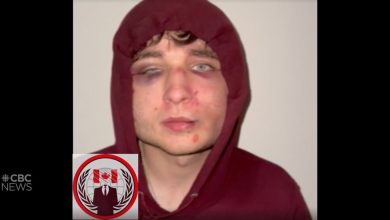Gaza Crisis Unites American Muslims in Anger and Mourning
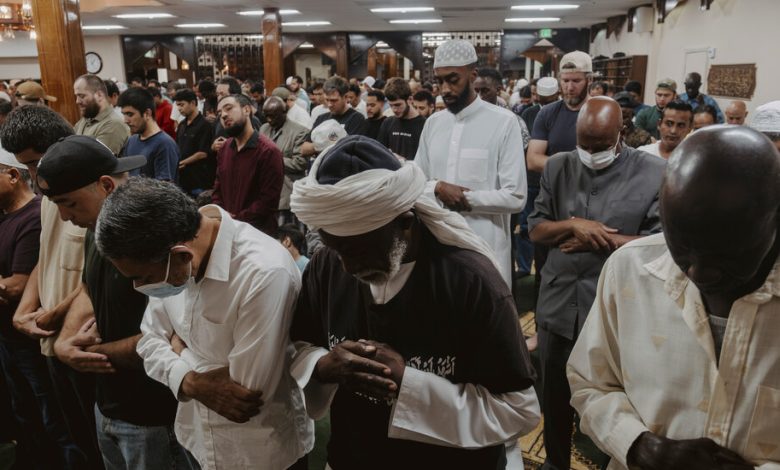
Hundreds of worshipers filed into Friday prayer at a gold-domed mosque in Tempe, Ariz., with the violence in Israel and Gaza on their minds and sleeves. They wore “Free Palestine” T-shirts and black-and-white kaffiyeh scarves, and scrolled through updates on the war as they waited for the sermon to begin.
Omar Tawil, the imam of the Islamic Community Center of Tempe, delivered an impassioned message that condemned the killings and displacements of Palestinian civilians as Israel expanded its war against Hamas. He urged worshipers to respond with prayer, protest and support for victims.
“You should be angry,” Mr. Tawil said. “What have the children of Gaza done? What have the civilians done?”
If the attack by Hamas united the diverse, sometimes divided communities of American Jews in horror and grief, the escalating airstrikes and humanitarian crisis unfolding in the Gaza Strip stirred common strains of anger, sorrow and grievance at Muslim prayer services across the country on Friday.
Muslims from different sects, ethnic backgrounds and corners of the country — African Americans in Washington, D.C., Somali refugees in Minneapolis, Indonesian immigrants in Maryland and Syrian Americans in Los Angeles — were focused on the rising death toll in Gaza.
And the Friday prayer, an important day of worship when imams often deliver sermons that address current events, coincided with Hamas’s call for Palestinians and Muslims around the world to protest. Rallies were held in major cities on Friday, and more were scheduled for the weekend.
“The events that are happening in these days are affecting not only our brothers and sisters in Islam in one small spot of the earth,” but “affecting each and every one of us,” Imam Abdussamad Madad said during a sermon at the Indonesian Muslim Association in America in Silver Spring, Maryland.
In sermons and conversations afterward, Muslim clerics and congregants grappled with whether they should speak out or stay silent, attend public rallies to support Palestine or stay away from potentially volatile demonstrations, track every horrifying development on the news or disengage.
Jaylani Hussein, executive director of the Minnesota chapter of the Council on American-Islamic Relations, said Islamic centers in the Minneapolis area had been reluctant to hold vigils and other public events to honor those killed. He said many were concerned for their safety in a city where mosques have been attacked in recent years.
There were few direct mentions of the attack that Hamas unleashed in Israel on Oct. 7, in which at least 1,300 people were killed and 150 taken hostage, provoking the latest military barrage from Israel. Instead, speakers and worshipers focused on Israel’s blockade of Gaza and past military actions against Palestinians, and criticized American politicians who declared their solidarity with Israel for ignoring decades of Palestinians’ suffering.
But in Los Angeles, the invited guest speaker at the Islamic Center of Southern California decided to reach across religious divides and focus his sermon on compassion and the sanctity of all innocent lives, including Jews.
The speaker, Dr. Saleh Kholaki, a Syrian-born dentist in Los Angeles, urged congregants not to allow their grief and anger to erase one another’s humanity.
“In Islam, we cannot carry out any violence against innocent civilians,” Dr. Kholaki said. “It makes no difference if the civilian is a Muslim, Christian or a Jew. Aggression against one is aggression against all.”
But he and other speakers at mosques around the country acknowledged that they felt particularly despondent on the cusp of what could be a full-scale war in Gaza. The Palestinian Ministry of Health has said that at least 1,900 Palestinians have been killed in the current conflict.
“They are being killed by the thousands,” Dr. Kholaki said. “And the world is not moving to save them.”
Muslim leaders say they have seen an increase in threats and reports of anti-Muslim harassment over the past week, an echo of similar spikes after the Sept. 11 attacks and terror attacks in San Bernardino, Calif., and Paris in 2015.
Many mosques and synagogues have regular armed guards and keep in close contact with the police, but on Friday several Muslim leaders said they had added extra security.
Two additional armed security guards roamed the grounds of the Islamic Center of Southern California as worshipers slipped off their shoes. In Tempe, Ariz., a police cruiser was parked at the main entrance of the mosque for much of the day on Friday. In Washington D.C., worshipers filed through a metal detector on their way into the Masjid Muhammad to hear a visiting imam urge people to seek unity and warn that “war is nothing to play with.”
In interviews, many religious leaders and worshipers said they had spent the past few days feeling increasingly helpless, unable take any action from thousands of miles away that would stop the killing, or help friends and family who were stuck in Gaza.
At mosque after mosque, they repeated that the answer lay in God and prayer.
“You’re not going to solve the problem by being glued to the news,” Sayyid Sulayman Ali Hassan encouraged congregants at the Imam al-Asr Masjid, a Shiite mosque in the D.C. area. “You’re not going to solve the problem by speaking out in emotion.”
Mr. Hassan said his goal was to convey to his congregation that there should be recognition for the humanity of everyone.
“I strongly believe it’s in the interests of the United States, both in terms of our immediate interest and our long-term interest, to be perceived by not just people in the Middle East but around the world as believing in the values that we speak of, rather than just using them for when our interests are served,” he said. “We’re having this conversation because there’s a tragedy that’s befallen an ally of the United States.”
He said attacks on Palestinians did not receive the same attention as attacks on Israel among U.S. media and political institutions. “We hear tragedies from people we identify with in a different way than people we don’t identify with,” he said.
In Minneapolis, the bloodshed was on everyone’s mind at a Friday afternoon service organized by the University of Minnesota Muslim Students Association.
Taher Herzallah, a university graduate student, delivered a sermon calling the bombing campaign targeting sites in Gaza “a genocide unfolding in front of our own eyes.”
Mr. Herzallah, who has relatives in Gaza, called Israel the principal aggressor in the conflict and said the United States, because of its support for Israel, was complicit “in the murder of Muslims.” He called on the young Muslims in attendance to be vocal in the days ahead.
“Every Muslim needs to get out of their comfort zone,” said Mr. Herzallah, who serves as the director of outreach and grassroots organizing at American Muslims for Palestine. “We will shut this city down if we have to.”
Still, the communion of prayer brought some solace for Palestinian Muslims who say they have been terrified about the fates of relatives living — or feared dead — in Gaza.
Mohamed El-Sharkawy, 63, said one of his nephews had been killed on the first day of Israel’s airstrikes and two of his nieces’ homes were destroyed. He wakes up at 2 a.m. and tries to reach relatives, but cannot get in touch with anyone.
He came to Friday prayer at the Islamic Community Center in Tempe for a spiritual outlet for that fear, outrage and grief.
“This is something we all feel,” he said.
Reporting was contributed by Sergio Olmos from Los Angeles, Darren Sands from Washington and Robert Chiarito from Chicago.

